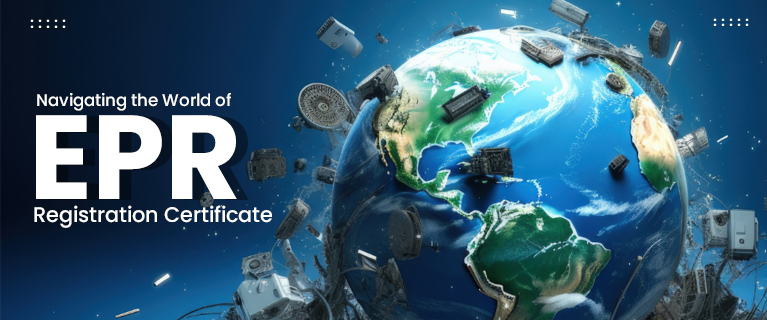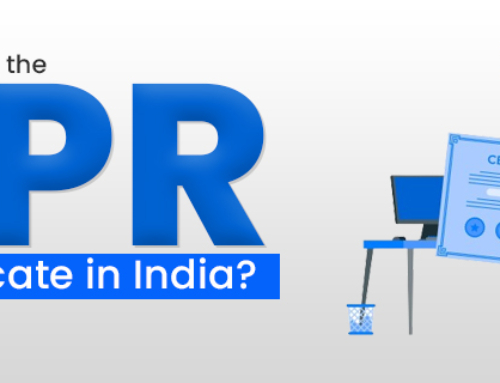Extended Producer Responsibility (EPR) stands as a pivotal paradigm shift in environmental sustainability, compelling manufacturers to actively engage in the entire lifecycle of their products. At its core, EPR requires manufacturers to secure an EPR Registration Certificate, a testament to their commitment to establishing robust waste collection and recycling systems. This initiative marks a departure from traditional waste management approaches, transferring the responsibility of handling end-of-life products—from takeback to disposal and recycling—from governments to the producers themselves.
What is Extended Producer Responsibility?
Contents
- What is Extended Producer Responsibility?
- Global Adoption of EPR Frameworks
- EPR Roadmap in India
- Roles & Challenges for Companies
- Benefits of EPR Systems :
- Incentivizing green products that minimize ecological burdens as mandated under registration conditions:
- Increased recycling and reduced landfill waste as per certificate designated targets:
- 3. Financial shift from municipalities towards producers:
- 4. Spur innovations in the recycling industry eyeing license renewals:
- Conclusion
The global adoption of EPR reflects a growing awareness of the environmental impact of consumer goods. As nations grapple with escalating waste management challenges, EPR Registration Certificate emerges as a proactive strategy to mitigate the ecological footprint associated with product consumption. Across the world, various jurisdictions have embraced EPR frameworks tailored to their specific needs, emphasizing accountability and environmental stewardship. This article delves into the nuances of EPR adoption on a global scale, exploring diverse regulatory landscapes and shedding light on the successes and challenges encountered.
Zooming in on India, the article illuminates the country’s approach to EPR, delineating specific regulations that manufacturers must navigate. India, a burgeoning market with a burgeoning consumer base, grapples with the dual challenge of economic growth and environmental sustainability. EPR Registration Certificate in India manifests as a key instrument in reconciling these seemingly conflicting objectives. By examining the regulatory intricacies unique to India, this article provides valuable insights into how the nation is aligning its environmental policies with the demands of a rapidly expanding economy.
Read Also This – Guide To Getting EPR Certification Online
In dissecting the roles of companies within the EPR framework, the article unveils the multifaceted responsibilities that manufacturers shoulder. From designing eco-friendly products to establishing efficient takeback systems and facilitating recycling, companies play a pivotal role in shaping a sustainable future. The challenges inherent in EPR Registration Certificate implementation, ranging from logistical hurdles to financial considerations, are scrutinized, offering a comprehensive understanding of the obstacles that companies may encounter.
Despite these challenges, the article emphasizes the overarching benefits of EPR. It explores how EPR fosters a circular economy, reduces landfill burdens, and promotes resource conservation. By elucidating the positive environmental and economic impacts, the article advocates for the widespread adoption and continued refinement of EPR Registration Certificate as an indispensable tool for navigating the intricate nexus between industrial growth and environmental preservation.
EPR makes companies accountable for the entire lifecycle of goods, especially end-of-life management as mandated through terms and conditions of the EPR Registration Certificate. Producers include manufacturers, importers, brand owners. Essentially, they must:
1. Design sustainable products by minimizing environmental footprints as specified under EPR registration guidelines
2. Implement takeback systems for post-consumer products in line with collection targets set out in certificates
3. Recover resources via reuse, recycling etc. based on stipulated recycling efficiencies.
Global Adoption of EPR Frameworks
Many regions have legislated EPR frameworks targeting packaging waste, e-waste, batteries etc. The EU’s Waste Framework Directive makes EPR compulsory for improved resource recovery. Member countries issue EPR Registration Certificates outlining recycling obligations. Germany’s packaging regulations consistently achieve over 80% recycling rates. Canada, Japan, Korea also mandate EPR through issued certificates and licenses to manage ecological issues. 400+ EPR schemes exist globally.
EPR Roadmap in India
India’s Plastic Waste Rules require companies to obtain an EPR registration document from pollution boards prior to setting up collection or recycling. E-waste rules also mandate takeback through authorized dismantlers and recyclers holding valid certificates. Draft battery regulations propose similar provisions. More sectors are likely to come under licensing-based EPR mandates for environment compliance.
Roles & Challenges for Companies
Key producer roles prescribed under EPR registration terms include:
Extended Producer Responsibility (EPR) stands as a pivotal paradigm shift in environmental sustainability, compelling manufacturers to actively engage in the entire lifecycle of their products. At its core, EPR requires manufacturers to secure an EPR Registration Certificate, a testament to their commitment to establishing robust waste collection and recycling systems. This initiative marks a departure from traditional waste management approaches, transferring the responsibility of handling end-of-life products—from takeback to disposal and recycling—from governments to the producers themselves.
The global adoption of EPR Registration Certificate reflects a growing awareness of the environmental impact of consumer goods. As nations grapple with escalating waste management challenges, EPR emerges as a proactive strategy to mitigate the ecological footprint associated with product consumption. Across the world, various jurisdictions have embraced EPR frameworks tailored to their specific needs, emphasizing accountability and environmental stewardship. This article delves into the nuances of EPR adoption on a global scale, exploring diverse regulatory landscapes and shedding light on the successes and challenges encountered.
Zooming in on India, the article illuminates the country’s approach to EPR, delineating specific regulations that manufacturers must navigate. India, a burgeoning market with a burgeoning consumer base, grapples with the dual challenge of economic growth and environmental sustainability. EPR Registration Certificate in India manifests as a key instrument in reconciling these seemingly conflicting objectives. By examining the regulatory intricacies unique to India, this article provides valuable insights into how the nation is aligning its environmental policies with the demands of a rapidly expanding economy.
Read Also This – How To Get EPR Certification or License in India
In dissecting the roles of companies within the EPR framework, the article unveils the multifaceted responsibilities that manufacturers shoulder. From designing eco-friendly products to establishing efficient takeback systems and facilitating recycling, companies play a pivotal role in shaping a sustainable future. The challenges inherent in EPR implementation, ranging from logistical hurdles to financial considerations, are scrutinized, offering a comprehensive understanding of the obstacles that companies may encounter.
Despite these challenges, the article emphasizes the overarching benefits of EPR Registration Certificate. It explores how EPR fosters a circular economy, reduces landfill burdens, and promotes resource conservation. By elucidating the positive environmental and economic impacts, the article advocates for the widespread adoption and continued refinement of EPR as an indispensable tool for navigating the intricate nexus between industrial growth and environmental preservation.
Benefits of EPR Systems :
EPR offers sustainability benefits like:
Incentivizing green products that minimize ecological burdens as mandated under registration conditions:
Increased recycling and reduced landfill waste as per certificate designated targets:
3. Financial shift from municipalities towards producers:
4. Spur innovations in the recycling industry eyeing license renewals:
Read Also This – Register EPR Online for Plastic & E-Waste
Thus mandatory EPR Registration Certificate schemes obtained through registrations can steer production, consumption and disposal patterns towards circular ecological goals.
Conclusion
EPR Registration Certificate policy tools see global success by binding producers legally through registrations and recycling certificates for managing post-consumer waste sustainably. India has similar registration-based EPR aims to tackle plastic and electronic waste which will get extended across sectors. This shows potential to transform life cycles towards circular economy via producer certificates stipulating collection and recycling responsibilities.






